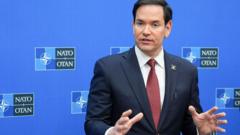U.S. Secretary of State Marco Rubio has announced an immediate revocation of visas for all South Sudanese passport holders, a decision prompted by the South Sudanese government's refusal to accept its citizens being deported from the U.S. In his statement on Saturday, Rubio made it clear that South Sudanese citizens arriving at U.S. ports of entry would also be denied entry. He attributed these actions to what he described as "the failure of South Sudan's transitional government to accept the return of its repatriated citizens in a timely manner."
The move aligns with a crucial element of President Donald Trump's immigration agenda, which is focused on removing individuals who are unlawfully present in the United States, emphasizing "mass deportations." Rubio stated, "It is time for the Transitional Government of South Sudan to stop taking advantage of the United States," reinforcing the expectation that every nation must accept the timely return of their nationals when deported from another country.
Tensions in South Sudan are currently heightened, raising fears that the nation could slide back into civil war. On March 8, U.S. authorities ordered all non-emergency staff to evacuate South Sudan due to regional violence that threatens the fragile peace established by a 2018 agreement.
Previously, South Sudanese individuals in the U.S. had benefitted from Temporary Protected Status (TPS), allowing them to stay temporarily due to unsafe conditions back home. However, this status is slated to expire on May 3. Since its independence in 2011, South Sudan has struggled with internal conflict, with a civil war erupting just two years later, resulting in over 400,000 fatalities. Although a power-sharing agreement was put in place in 2018, essential components—including the drafting of a new constitution, elections, and the integration of armed factions—remain unfulfilled, contributing to ongoing unrest.
The current U.S. administration has faced diplomatic friction with other nations regarding the deportation of their citizens. Notably, Colombian President Gustavo Petro previously halted U.S. military flights bringing back deported nationals, though he later acquiesced after threats of severe tariffs were issued by Trump.



















